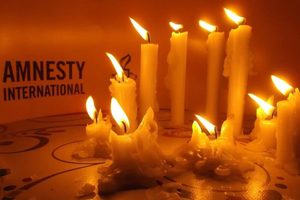This month, those of us who celebrate Hanukah commemorate a miracle of light: a flame, which in our people’s moment of darkness, shone far beyond the limits of physics. The world’s Christians will celebrate the birth of Jesus and shortly after, Muslims will celebrate the birth of the Prophet Mohammad. For each of these religious communities, these celebrations commemorate events which brought light and hope in to the world.
This month we also celebrated the anniversary of another important event: 66 years ago, the General Assembly of the United Nations proclaimed theUniversal Declaration of Human Rights, a modern-day tale of how out of humanity’s darkest moments, a beacon of hope can emerge.
Whether one is a person of faith or not, and whether that faith is one I mentioned or another, there is one thing we can all agree on: right now, there are a lot of people around the world in desperate need of some light. Over the past month, hundreds of thousands of people from around the world joined to raise their voices in Amnesty International’s annual Write for Rights letter-writing marathon, to help individuals and communities from around the world, whose stories join together to paint a pretty bleak picture about humanity today. These stories are about victims of torture, people facing the death penalty, people fighting for freedom of expression, victims of hate crimes, victims of police violence, prisoners of conscience, and others.
When I speak with school kids about human rights, there is an example I like to give. I ask three kids to stand up. One of them is told he or she is hungry, and at the end of the room there is food, and they have the right to that food. A second kid is asked to stand in the way of the first kid, preventing their access to the food. The third kid is given no role, but to watch. For the first two kids, the roles are clear: The first is having their human rights violated by the actions of the second, who should be stopped and held accountable. But what of the third kid? That kid agrees everyone has the right to access to food, but is doing nothing when that right is being denied to someone else. The point of this exercise is to learn that a right is meaningless if individuals within society don’t have effective access to them. And that if we as a society accept certain principles as norms, as rights that must be afforded to all, it is therefore our responsibility as members of society to take action to assure those rights can be accessed by all members of society.
We each play the role of each of these three kids sometimes, and our awareness of this is important. We should always ask ourselves: When are my rights being violated? When am I acting in a way that denies someone else their rights? When am I standing by as another’s rights are being violated?
In this holiday season, we will be celebrating miracles that happened to us. Let us also take this time to think: what miracles can we help make happen for others? As we celebrate a triumph of light over darkness, let us think today: Who is living in darkness today, who could I help with my light?
Read more:
In Israel, as in Gaza, human rights are the last line of protection (Blog, 6 August 2014)


